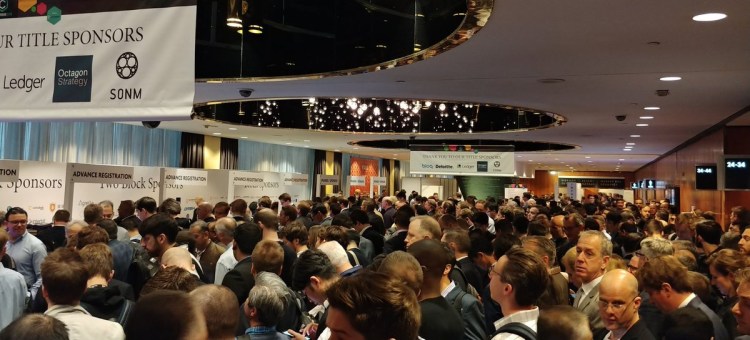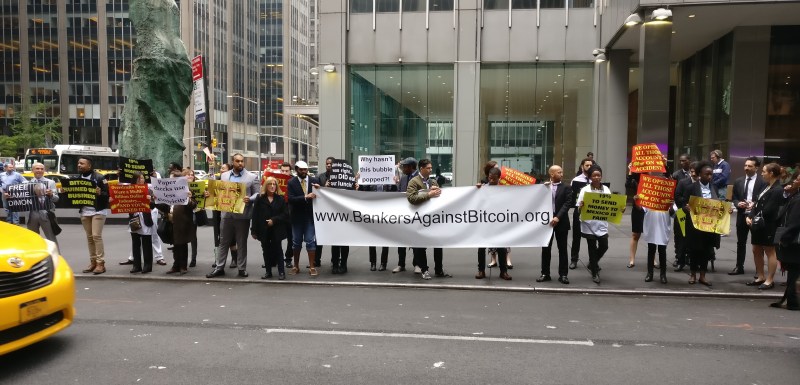The premier event of the emerging blockchain and crypto community is Consensus, which takes place in New York every May. The event is backed by the powerful and influential Digital Currency Group, of which longtime industry thought-leader and innovator Barry Silbert is CEO. If crypto had a Super Bowl, this would be it.
The event took place this week, and from the moment I walked, I knew things would be different from in the past.
Estimates had the attendee numbers reaching up to 9,000, a 4.5x increase over last year’s 2,000 attendees. The huge growth in registration reflects the increased interest and awareness globally about Bitcoin and Ethereum and other cryptocurrencies and blockchain technology overall. At last year’s conference, Bitcoin’s value broke through the $2,000 barrier (partially because of the excitement at the event itself, according to many). We all know what happened since then.
This year’s conference, however, did not have the same madness around Bitcoin and Ethereum. The interest and attention was much more diffused across the hundreds of exhibitors and thousands of attendees. Nearly every single spot that could have some form of advertisement (elevator doors, escalator walls, wraparounds, and more) had a crypto-related advertisement. The raw numbers of people and the total volume of advertising and exhibitor fees led to speculation that the total gross revenue for the conference could top $100,000,000. A more likely scenario is that it was in the $50,000,000 range, but either one is definitely possible.
June 5th: The AI Audit in NYC
Join us next week in NYC to engage with top executive leaders, delving into strategies for auditing AI models to ensure fairness, optimal performance, and ethical compliance across diverse organizations. Secure your attendance for this exclusive invite-only event.
Bottom line: Money (in addition to talent) is flowing into the crypto space at a ridiculous pace, and it needs a place to go. Consensus, given the mindshare and numbers, provides that and charges accordingly. With a second-floor exhibit hall filled with probably 100 vendors, it is clear many people are willing to pay for the privilege.
Though crowded, the event is worth attending because of the immutable truth that so many of the people worth connecting with are there. Nothing exemplifies this better than the annual Coin Center dinner, which brings crypto luminaries together for one night to celebrate the fantastic, underappreciated, and critical work that this non-profit does in educating Congress and government officials about crypto, blockchain, and Bitcoin. The dinner celebrates them and their work, which means it brings out the “Who’s Who” of crypto. It’s the dinner where the keynote is given by people like Xapo founder Wences Casares or legendary venture capitalist Fred Wilson. The dinner, like the attendees who have attended for multiple years in a row, is really a community celebration to acknowledge that, with each passing year, more and more people realize the true value and benefits of the invention that Satoshi Nakamoto let loose on the world on January 3, 2009.
The feeling that pervaded the dinner and the conference overall was the inevitability of blockchain technology — that it is here and here to stay.
Admittedly, that has different meanings for different attendees. The “hard-core” crypto people traditionally have a more libertarian bent aimed at the reinvention of money and government. But there is also huge interest on the private blockchain side, with consulting firms like Accenture and Deloitte, traditional enterprise providers like IBM, and startups like PeerNova all having a presence.
Still, among the nearly 9,000 attendees, you would have had a hard time spotting someone who wasn’t excited about the potential of crypto in one way or another, all the way from the enterprise supply chain use case to mobile-first decentralized apps. Universally acknowledged was the fact that many hurdles, regulatory, legal, and otherwise need to be addressed as well as complex usability, security, on-ramping, and scalability concerns.
Yet, despite these barriers, there is a lot of confidence and optimism present. Nothing perhaps highlighted the feeling that comes from inevitability more than a mock protest staged across the street from the conference by a group calling itself “Bankers Against Bitcoin.” With placards asking for understanding for Jamie Dimon and Wells Fargo, they chanted, “Hey hey, ho ho, Bitcoin has got to go.” One protester loudly proclaimed that Bitcoin was taking “good-paying” Wall Street jobs away from the bankers and it needed to be stopped.
While that future may seem far-off to some, to many of the attendees at the conference, it certainly seems like it could be in reach, and sooner than we all think. Chris McCann has recently put together an excellent series of charts entitled, 12 Graphs That Show Just How Early Cryptocurrency Is and if the analysis is on point, it tells us that adoption may come sooner than we all think. The fact that Zcash announced its approval by NYDFS during the event, joining only Bitcoin and Ether in that group for now, served as just one more data point supporting the growing trend that is crypto and fueling the energy around the event, which is sure to increase popularity and demand for the future.
That popularity, however, comes with a steep price. This year it came in the form of a very poor initial event attendee experience. I arrived at the exact same time this year as I did last year, 9:15 am. Whereas last year’s registration process took approximately three minutes, this year’s took 1.5 hours over four lines and two floors. It was extremely unpleasant, and I wasn’t the only one who thought so. The queue issue was present in both getting into sessions and discussions as well as restrooms and food service. Finding a place to sit for even a few minutes was extremely challenging. It was pretty clear the Consensus organizers either did not take the logistics seriously enough or just got aggressive (or greedy) with the opportunity to sell tickets at $3,000 when last year’s ticket was $999 (or thereabouts).
I spoke with one of the event’s organizers and he admitted they had overreached. It was an honest mistake in a rapidly growing industry. I suggested that next year the event should move to the Javits Convention Center.
For more on last year’s Consensus event, see my past write up.
Jeremy Epstein is CEO of Never Stop Marketing and author of The CMO Primer for the Blockchain World. He currently works with startups in the blockchain and decentralization space, including OpenBazaar, Zcash, ARK, Gladius, Peer Mountain and DAOstack.


